冀教版五年级英语语法知识点总结归纳
- 格式:dps
- 大小:635.50 KB
- 文档页数:4
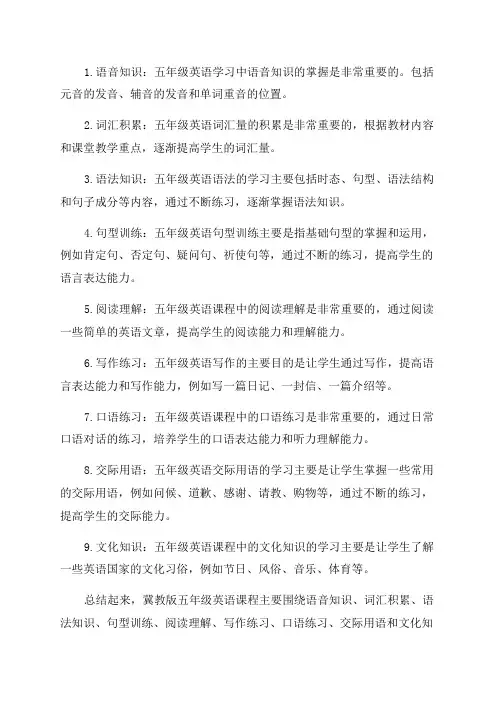
1.语音知识:五年级英语学习中语音知识的掌握是非常重要的。
包括元音的发音、辅音的发音和单词重音的位置。
2.词汇积累:五年级英语词汇量的积累是非常重要的,根据教材内容和课堂教学重点,逐渐提高学生的词汇量。
3.语法知识:五年级英语语法的学习主要包括时态、句型、语法结构和句子成分等内容,通过不断练习,逐渐掌握语法知识。
4.句型训练:五年级英语句型训练主要是指基础句型的掌握和运用,例如肯定句、否定句、疑问句、祈使句等,通过不断的练习,提高学生的语言表达能力。
5.阅读理解:五年级英语课程中的阅读理解是非常重要的,通过阅读一些简单的英语文章,提高学生的阅读能力和理解能力。
6.写作练习:五年级英语写作的主要目的是让学生通过写作,提高语言表达能力和写作能力,例如写一篇日记、一封信、一篇介绍等。
7.口语练习:五年级英语课程中的口语练习是非常重要的,通过日常口语对话的练习,培养学生的口语表达能力和听力理解能力。
8.交际用语:五年级英语交际用语的学习主要是让学生掌握一些常用的交际用语,例如问候、道歉、感谢、请教、购物等,通过不断的练习,提高学生的交际能力。
9.文化知识:五年级英语课程中的文化知识的学习主要是让学生了解一些英语国家的文化习俗,例如节日、风俗、音乐、体育等。
总结起来,冀教版五年级英语课程主要围绕语音知识、词汇积累、语法知识、句型训练、阅读理解、写作练习、口语练习、交际用语和文化知
识等方面进行学习。
通过综合运用这些知识点,提高学生的语言表达能力和语言运用能力,达到扎实掌握英语基础知识的目的。

新冀教版五年级英语知识点汇总一、家庭成员:family 家庭 father 父亲 mother 母亲 grandfather 爷爷grandmother奶奶sister姐妹brother兄弟parents 父母uncle叔叔aunt 阿姨cousin表兄妹一、职业:teacher 老师doctor医生 nurse护士 worker工人famer农民student 学生bus driver公交车司机二、交通工具:car轿车bike自行车train火车 plane飞机 bus公交车三、十二生肖:rat鼠ox 牛tiger虎rabbit兔dragon龙snake蛇horse马sheep羊monkey 猴rooster鸡dog狗pig 猪四、序数词first 第一second 第二third 第三fourth 第四fifth 第五sixth 第六seventh 第七eighth 第八ninth 第九 tenth 第十 eleventh第十一 twelfth 第十二五、反义词:fast---slow 快-慢 this---that这个--那个 these---those这些-那些old---young老---年轻 tall---short 高-矮thin-fat瘦-胖go-come去-来near-far 近-远 big-small 大-小 black- white 黑-白 cold- warm 冷-暖七、节日:the SpringFestival春节theMid-Autumn Festival中秋节 the Dragon Boat Festival 端午节Natival Day国庆节 NewYear’s Day新年 Children’s Day 儿童节八、星期:Sunday 星期日Monday 星期一Tuesday 星期二Wednesday 星期三Thursday 星期四 Friday 星期五Saturday 星期六九、月份:January 一月February 二月March 三月April 四月May五月June 六月July七月August 八月September九月 Octorber十月November 十一月December十二月十、动词及词组:go for a walk 去散步 read books 读书 waterflowers 浇花plant flowers 浇花watch TV看电视 goshopping 购物watch a film 看电影watchthe animals 看动物plant vegetables 种蔬菜 fly kites放风筝 work onthe computer玩电脑 play basketball打篮球 go fishing 钓鱼wonderful 太棒了beautiful 美丽的十一、句子及对话:1、Li Ming’sfamily 李明的家庭2、I don’t have brothers or sisters. 我没有兄弟姐妹3、How old is your grandfather?你爷爷多大了?4、My grandfather is eighty-one years old.我爷爷81岁。
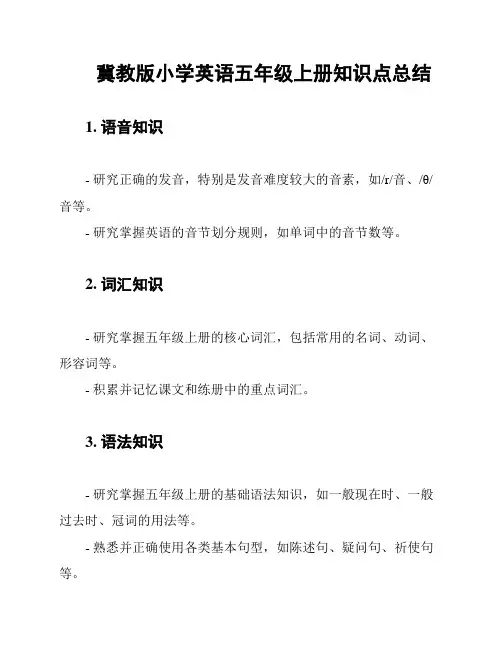
冀教版小学英语五年级上册知识点总结
1. 语音知识
- 研究正确的发音,特别是发音难度较大的音素,如/r/音、/θ/音等。
- 研究掌握英语的音节划分规则,如单词中的音节数等。
2. 词汇知识
- 研究掌握五年级上册的核心词汇,包括常用的名词、动词、形容词等。
- 积累并记忆课文和练册中的重点词汇。
3. 语法知识
- 研究掌握五年级上册的基础语法知识,如一般现在时、一般过去时、冠词的用法等。
- 熟悉并正确使用各类基本句型,如陈述句、疑问句、祈使句等。
4. 阅读理解
- 提高阅读理解能力,通过阅读课文和练册中的短文,并回答相关问题来巩固所学的词汇和语法知识。
5. 口语表达
- 多加练口语,提高语音和语调准确性。
- 学会用简单的语言描述自己和他人的外貌、性格、爱好等。
6. 写作技能
- 研究书写大小写字母的规则,提高字母书写的规范性和美观性。
- 练书写句子和段落,培养书写的逻辑性和连贯性。
以上是冀教版小学英语五年级上册知识点的总结,希望能对你的研究有所帮助。
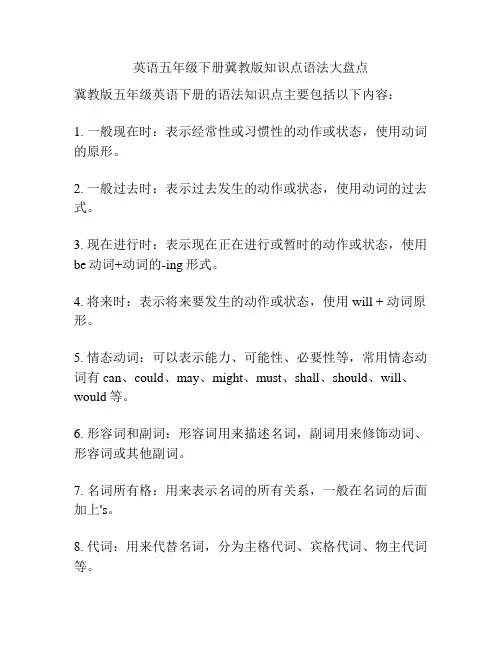
英语五年级下册冀教版知识点语法大盘点
冀教版五年级英语下册的语法知识点主要包括以下内容:
1. 一般现在时:表示经常性或习惯性的动作或状态,使用动词的原形。
2. 一般过去时:表示过去发生的动作或状态,使用动词的过去式。
3. 现在进行时:表示现在正在进行或暂时的动作或状态,使用be动词+动词的-ing形式。
4. 将来时:表示将来要发生的动作或状态,使用will + 动词原形。
5. 情态动词:可以表示能力、可能性、必要性等,常用情态动词有can、could、may、might、must、shall、should、will、would等。
6. 形容词和副词:形容词用来描述名词,副词用来修饰动词、形容词或其他副词。
7. 名词所有格:用来表示名词的所有关系,一般在名词的后面加上's。
8. 代词:用来代替名词,分为主格代词、宾格代词、物主代词等。
9. 介词:用来表示时间、地点、方式等关系的词语。
10. 句子的基本结构:包括主语、谓语、宾语和表语等。
这些是冀教版五年级英语下册的主要语法知识点,希望对你有所帮助。
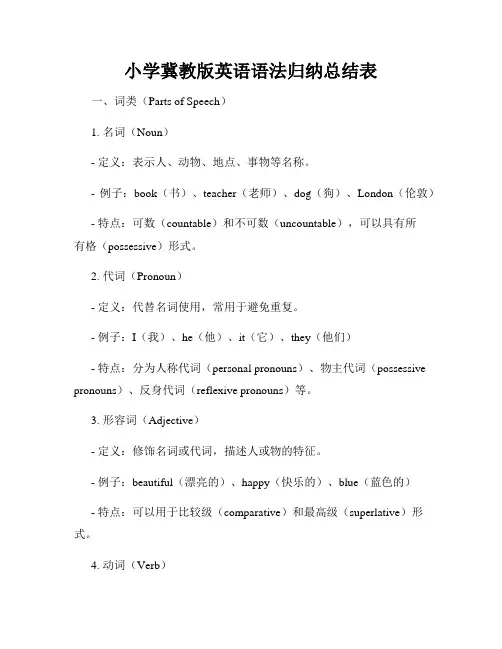
小学冀教版英语语法归纳总结表一、词类(Parts of Speech)1. 名词(Noun)- 定义:表示人、动物、地点、事物等名称。
- 例子:book(书)、teacher(老师)、dog(狗)、London(伦敦)- 特点:可数(countable)和不可数(uncountable),可以具有所有格(possessive)形式。
2. 代词(Pronoun)- 定义:代替名词使用,常用于避免重复。
- 例子:I(我)、he(他)、it(它)、they(他们)- 特点:分为人称代词(personal pronouns)、物主代词(possessive pronouns)、反身代词(reflexive pronouns)等。
3. 形容词(Adjective)- 定义:修饰名词或代词,描述人或物的特征。
- 例子:beautiful(漂亮的)、happy(快乐的)、blue(蓝色的)- 特点:可以用于比较级(comparative)和最高级(superlative)形式。
4. 动词(Verb)- 定义:表示动作、状态或存在。
- 例子:run(跑)、eat(吃)、play(玩)- 特点:根据时态(tense)和语态(voice)的不同形式变化。
5. 副词(Adverb)- 定义:修饰动词、形容词或副词,表示时间、地点、方式等。
- 例子:quickly(快速地)、now(现在)、here(这里)- 特点:可以用于构成比较级和最高级形式。
6. 介词(Preposition)- 定义:连接词与其他词之间的关系。
- 例子:in(在)、on(在……上)、under(在……下)- 特点:常用于表示位置、方向、时间、原因等。
7. 连词(Conjunction)- 定义:连接词组、句子或句子的部分。
- 例子:and(和)、but(但是)、because(因为)- 特点:可以表示并列关系、递进关系、转折关系等。
8. 感叹词(Interjection)- 定义:表示强烈的情感或观点。
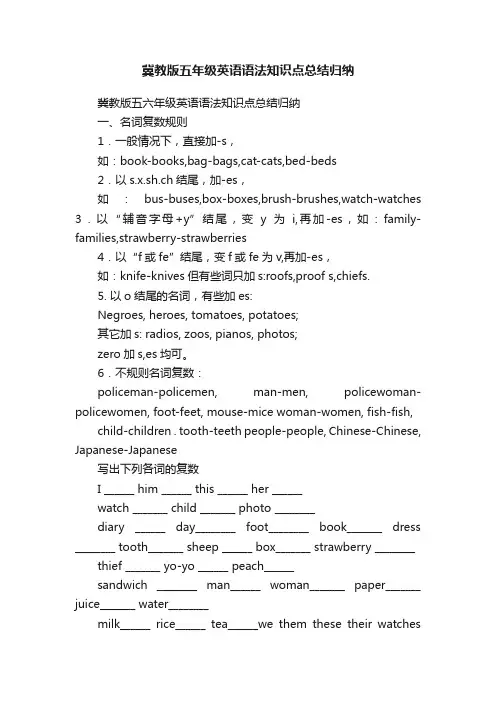
冀教版五年级英语语法知识点总结归纳冀教版五六年级英语语法知识点总结归纳一、名词复数规则1.一般情况下,直接加-s,如:book-books,bag-bags,cat-cats,bed-beds2.以s.x.sh.ch结尾,加-es,如:bus-buses,box-boxes,brush-brushes,watch-watches 3.以“辅音字母+y”结尾,变y为i,再加-es,如:family-families,strawberry-strawberries4.以“f或fe”结尾,变f或fe为v,再加-es,如:knife-knives但有些词只加s:roofs,proof s,chiefs.5. 以o结尾的名词,有些加es:Negroes, heroes, tomatoes, potatoes;其它加s: radios, zoos, pianos, photos;zero加s,es均可。
6.不规则名词复数:policeman-policemen, man-men, policewoman-policewomen, foot-feet, mouse-mice woman-women, fish-fish, child-children . tooth-teeth people-people, Chinese-Chinese, Japanese-Japanese写出下列各词的复数I ______ him ______ this ______ her ______watch _______ child _______ photo ________diary ______ day________ foot________ book_______ dress ________ tooth_______ sheep ______ box_______ strawberry ________ thief _______ yo-yo ______ peach______sandwich ________ man______ woman_______ paper_______ juice_______ water________milk______ rice______ tea______we them these their watcheschildren photos diaries days feet books dresses teeth sheep boxes strawberries thieves yo-yos peaches sandwiches men women paper juice water milk rice tea。

冀教版五年级英语下册各单元语法知识总结道客巴巴冀教版五年级英语下册共有六个单元,其中每个单元都有自己的语法知识点。
下面就对这些知识点进行总结。
一、Unit 1 What a Wonderful World1.形容词的比较级和最高级:用于比较两个或多个人或事物的优劣。
如:Tom is taller than Tim. Jack is the tallest in his class.2.情态动词can和can't:can表示能力,can't表示不能。
如:I can swim. I can't fly.二、Unit 2 At the Funfair1.一般过去时:表示过去发生的动作或状态。
如:I went to the funfair yesterday.2.特殊疑问句:用于询问特定信息的疑问句。
如:What did you do at the funfair?三、Unit 3 What Are You Doing for Vacation?1.现在进行时:表示现在正在进行的动作。
如:I am swimming in the pool.2.介词in和on的用法:in表示在某个范围内,on表示在某个表面上。
如:I am in the pool. I am on the bed.四、Unit 4 Where Is My Schoolbag?1.指示代词this和that的用法:this用于近处,that用于远处。
如:This is my schoolbag. That is your pencil.2.物主代词的用法:表示所有关系的代词。
如:This is my book.That is his pencil.五、Unit 5 What's the Weather Like Today?1.一般现在时:表示现在的状态或经常性动作。
如:It is sunny today.2.句型How + 形容词 + 主语 + 动词:用于询问某人的感受或状态。
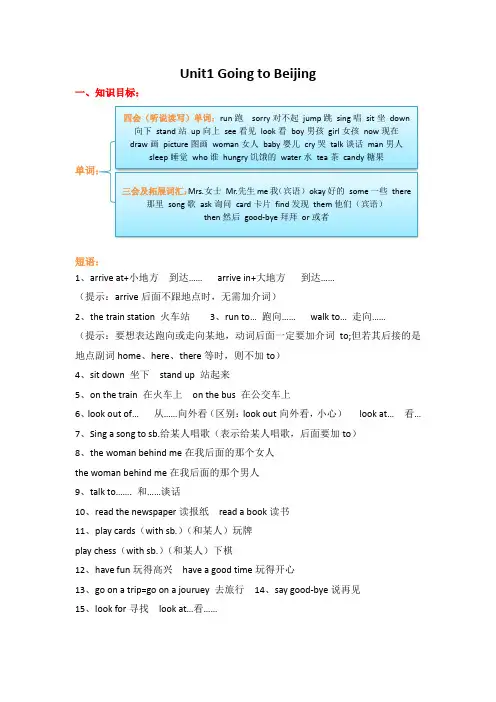
Unit1 Going to Beijing一、知识目标:四会(听说读写)单词:run跑sorry对不起jump跳sing唱sit坐down 向下stand站up向上see看见look看boy男孩girl女孩now现在draw画picture图画woman女人baby婴儿cry哭talk谈话man男人sleep睡觉who谁hungry饥饿的water水tea茶candy糖果单词:三会及拓展词汇:Mrs.女士Mr.先生me我(宾语)okay好的some一些there 那里song歌ask询问card卡片find发现them他们(宾语)then然后good-bye拜拜or或者短语:1、arrive at+小地方到达…… arrive in+大地方到达……(提示:arrive后面不跟地点时,无需加介词)2、the train station 火车站3、run to… 跑向…… walk to… 走向……(提示:要想表达跑向或走向某地,动词后面一定要加介词to;但若其后接的是地点副词home、here、there等时,则不加to)4、sit down 坐下stand up 站起来5、on the train 在火车上on the bus 在公交车上6、look out of… 从……向外看(区别:look out向外看,小心)look at… 看…7、Sing a song to sb.给某人唱歌(表示给某人唱歌,后面要加to)8、the woman behind me在我后面的那个女人the woman behind me在我后面的那个男人9、talk to……. 和……谈话10、read the newspaper读报纸read a book读书11、play cards(with sb.)(和某人)玩牌play chess(with sb.)(和某人)下棋12、have fun玩得高兴have a good time玩得开心13、go on a trip=go on a jouruey 去旅行14、say good-bye说再见15、look for寻找look at…看……句子与句型:1、Please don’t run!请不要跑!2、I want to jump!我想跳!3、What do they see on the train?他们在火车看见了什么?句型:what+do/does +主语+see+地点词组?用来询问某人在某处看见了什么?答语:主语+see/sees+名词(+地点词组).4、Some boys and girls are playing there.一些男孩和一些女孩正在那里玩耍。
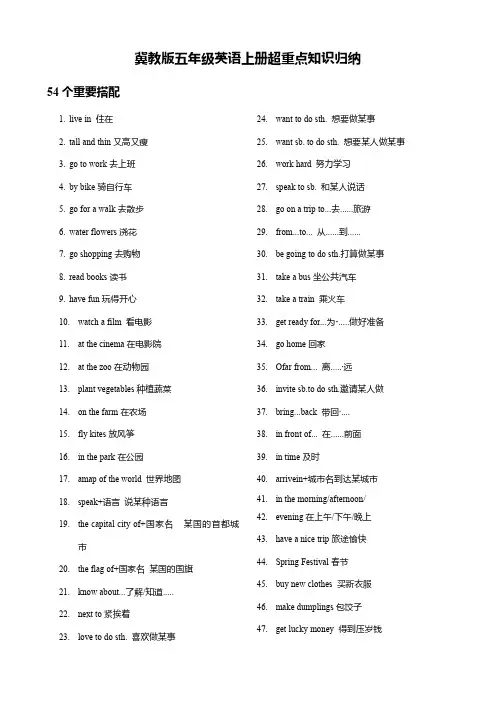
冀教版五年级英语上册超重点知识归纳54个重要搭配1.live in住在2.tall and thin又高又瘦3.go to work去上班4.by bike骑自行车5.go for a walk去散步6.water flowers浇花7.go shopping去购物8.read books读书9.have fun玩得开心10.watch a film看电影11.at the cinema在电影院12.at the zoo在动物园13.plant vegetables种植蔬菜14.on the farm在农场15.fly kites放风筝16.in the park在公园17.amap of the world世界地图18.speak+语言说某种语言19.the capital city of+国家名某国的首都城市20.the flag of+国家名某国的国旗21.know about...了解/知道.....22.next to紧挨着23.love to do sth.喜欢做某事24.want to do sth.想要做某事25.want sb.to do sth.想要某人做某事26.work hard努力学习27.speak to sb.和某人说话28.go on a trip to...去......旅游29.from...to...从......到......30.be going to do sth.打算做某事31.take a bus坐公共汽车32.take a train乘火车33.get ready for...为··.....做好准备34.go home回家35.Ofar from...离.....·远36.invite sb.to do sth.邀请某人做37.bring...back带回·....38.in front of...在......前面39.in time及时40.arrivein+城市名到达某城市41.in the morning/afternoon/42.evening在上午/下午/晚上43.have a nice trip旅途愉快44.Spring Festival春节45.buy new clothes买新衣服46.make dumplings包饺子47.get lucky money得到压岁钱48.the year of the rat鼠年49.Dragon Boat Festival端午节50.Mid-Autumn Festival中秋节51.have dragon boat races举行龙舟比赛52.watch the moon赏月53.eat moon cakes吃月饼54.on one’s way to...在某人去......的路上28个核心句型1.This is my father,my mother and me.句型:This is+家庭成员2.I have two grandfathers and two grandmothers.句型:主语+have/has+家庭成员3.He has white hair.(big eyes,long hair,a small mouth...)句型:主语+have/has(a/an)+表示外貌特征的形容词+身体部份4.My father is tall.(short.thin,strong...)句型:主语+be动词+描述外貌特征的形容词5.What does your father do?一My father is a teacher.(doctor.nurse.worker,farmer...)句型一What do/does+主语+do?一主语+be动词+a/an+职业名词6.一Where does he work?一He works at a school.(at a hospital in a supermarket,in an office...)句型一Where do/does+主语+work?一主语+work(s)+表示地点的介词短语7.一How does she go to work?一She goes to work by bike.(by car,by bus,by taxi...)句型一How do/does+主语+go to work?一主语+go/goes to work by+交通工具8.My grandfather likes to go for a walk.(water flowers,play on the computer...)句型:主语(第三人称单数)+likesto+动词(短语)原形(+其他)9.We like to watch a film at the cinema.(watch TY at home,fly kites in the park,plant vegetables on the farm...)句型:We like to+动词(短语)原形(+其他)10.This is a map of the world.(a map of China,an English book,the flag of China...)句型:This is+a/an/the+名词(短语)11.一What is the capital city of China,Li Ming?一Beijing is the capital city of China!句型一What is the capital city of+国家名?一①首都名(+is the capital city of+国家名)一②The capital city of+国家名+is+首都名12.I know about Canada.句型:主语+know(s)about+某事物13.一What do you know about Canada,Li Ming?一l know they speak English and French in Canada.句型一What do you know about+某事物?一l know+相关信息14.In the US.,they speak.句型:In+国家名,they speak+语言15.What do they speak in the U.K.?句型:What do/does+主语+speak in+国家名?16.Here's the flag of the U.K.句型:Here is/are+主语,(注意此处的主语不能是人称代词he/she/it/they...)17.There are many interesting places in Beijing.句型:①There is+不可数名词/a(n)+可数名词单数+表示地点的词或短语②There are+复数名词+表示地点的词或短语18.一Mum,may I travel to Beijing?(watch TV,play computer games.play basketball....)一To Beijing?I'm afraid not.句型一May l+动词(短语)原形(+其他)?一Yes,you may./Sure./Certainly.(肯定回答)或No,you may not./I’m afraid not.(否定回答) 19.This is Mrs.Li.May l speak to Mrs.Smith?句型:This is+某人May l speak to+某人?(电话用语)20.一When will you go to Beijing?(London,New York...)一We will go to Beijing in the morning on February3.(in the morning/afternoon,on October5...)句型一When will+某人+go(to)+地点?一某人+will go(to)+地点+时间21.一How far is it from Shijiazhuang to Beijing?一It's278kilometers.句型一How far is it from+A地+to+B地?一It’s+基数词+长度单位22.We are going to travel by train.(watch a film,play football...)句型:某人+be going to+动词(短语)原形(+其他)23.一Did you have a nice trip?一Yes,thanks.句型一Did you+动词(短语)原形(+其他)?一Yes,I/we did.(肯定回答)或No,I/we didn't.(否定回答)24.一What do you do for the Spring Festival?(his birthday,the Mid-Autumn Festival.Children's Day....)一We buy new clothes.(buy a big cake,make moon cakes,sing songs...)句型一What do you do for+某一天/某个节日?一I/We+动词(短语)原形(+其他)25.一What is my year?一Your year is the year of the rat.句型一What+is+某人的+year?一某人的+year is the year of the+十二生肖之一26.26My favourite is the Spring Festival.句型:My favourite(+事物类别)+is+某事物27.一What do you do on the Dragon Boat Festival?(the Lantern Festival,Teachers’Day,the Mid-Autumn Festival...)一We have dragon boat races and we eat zongzi.(eat yuanxiao,sing songs,eat moon cakes,watch the moon)句型一What do you do on+某一天/某个节日?一We+动词(短语)原形(+其他)28.I like these red trousers.I don't like those trousers.句型:I like/don't like+某物重点语法一、一般现在时意义1.表示事物或人物的一般特征或现时的状态;2.表示经常发生的或习惯性的动作;3.表示客观的事实或真理。
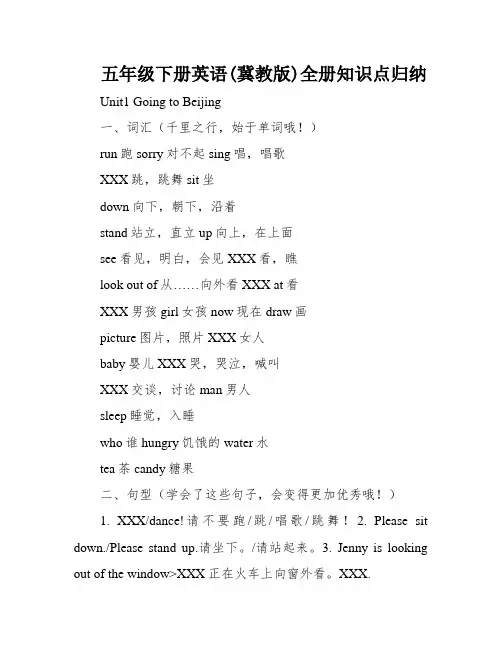
五年级下册英语(冀教版)全册知识点归纳Unit1 Going to Beijing一、词汇(千里之行,始于单词哦!)run跑sorry对不起sing唱,唱歌XXX跳,跳舞sit坐down向下,朝下,沿着stand站立,直立up向上,在上面see看见,明白,会见XXX看,瞧look out of从……向外看XXX at看XXX男孩girl女孩now现在draw画picture图片,照片XXX女人baby婴儿XXX哭,哭泣,喊叫XXX交谈,讨论man男人sleep睡觉,入睡who谁hungry饥饿的water水tea茶candy糖果二、句型(学会了这些句子,会变得更加优秀哦!)1. XXX/dance!请不要跑/跳/唱歌/跳舞!2. Please sit down./Please stand up.请坐下。
/请站起来。
3. Jenny is looking out of the window>XXX正在火车上向窗外看。
XXX.一些男孩和女孩正在那里玩。
5. I see a banana! /I see dumplings!我看到一个香蕉。
/我看到饺子!6. A: Are you singing, XXX?你在唱歌吗,XXX?B: No, I’m not.不,我没有。
7. A:Who is XXX?谁在说话?B: XXX XXX.XXX正在说话。
8. The baby is XXX在睡觉。
9. A: Who is XXX?谁饿了?B: I’m hungry!我饿了!10. A: Would you like some fruit?你想要一些水果吗?B: Yes, please. I’d like an apple and an orange, Mrs. Li. 是的。
我想要一个苹果和一个橙子,XXX。
11. A: Would you like some fruit, Li Ming?你想要一些水果吗,XXX?B: No, thanks, Mum. I’m thirsty.不,谢谢,妈妈。
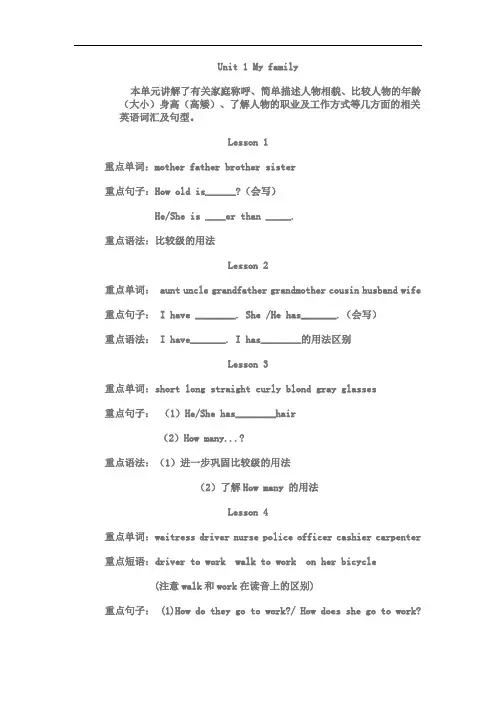
Unit 1 My family本单元讲解了有关家庭称呼、简单描述人物相貌、比较人物的年龄(大小)身高(高矮)、了解人物的职业及工作方式等几方面的相关英语词汇及句型。
Lesson 1重点单词:mother father brother sister重点句子:How old is______?(会写)He/She is ____er than _____.重点语法:比较级的用法Lesson 2重点单词: aunt uncle grandfather grandmother cousin husband wife重点句子: I have ________. She /He has_______.(会写)重点语法: I have_______. I has________的用法区别Lesson 3重点单词:short long straight curly blond gray glasses重点句子:(1)He/She has________hair(2)How many...?重点语法:(1)进一步巩固比较级的用法(2)了解How many 的用法Lesson 4重点单词:waitress driver nurse police officer cashier carpenter重点短语:driver to work walk to work on her bicycle(注意walk和work在读音上的区别)重点句子: (1)How do they go to work?/ How does she go to work?(2)What do they do?重点语法:交通工具前介词的用法Lesson 5重点短语: play checkers go for a walk read the newspaperwork on the computer skip with the skipping rope watch TV重点句子: (1) I like to________(2) He/She likes to__________重点语法:like 的用法Lesson 6重点短语: watch a movie fly a kite have supper buy clothes watch the animals buy clothes play badminton重点句子:(1)We go to_______to_______.(2) Do you go to_____to_____?Unit 2 My country and English speaking countries本单元讲解了中国、加拿大、美国、英国、澳大利亚五国的基本情况及其在世界地图上的分布情况。
Unit1 Going to Beijing一、词汇(千里之行,始于单词哦!)run 跑 sorry 对不起 sing 唱,唱歌dance 跳,跳舞 sit 坐down 向下,朝下,沿着stand 站立,直立 up 向上,在上面see 看见,明白,会见 look 看,瞧look out of 从……向外看 look at 看boy 男孩 girl 女孩 now 现在 draw 画picture 图片,照片woman 女人baby 婴儿 cry 哭,哭泣,喊叫talk 交谈,讨论man 男人sleep 睡觉,入睡who 谁 hungry 饥饿的 water 水tea 茶candy 糖果二、句型(学会了这些句子,会变得更加优秀哦!)1. Please don’t run/jump/sing/dance! 请不要跑/跳/唱歌/跳舞!2. Please sit down./Please stand up. 请坐下。
/请站起来。
3. Jenny is looking out of the window>詹妮正在火车上向窗外看。
4. Some boys and girls are playing there.一些男孩和女孩正在那里玩。
5. I see a banana! /I see dumplings!我看到一个香蕉。
/我看到饺子!6. A: Are you singing, Jenny? 你在唱歌吗,詹妮?B: No, I’m not. 不,我没有。
7. A:Who is talking? 谁在说话?B: Danny is talking. 詹妮正在说话。
8. The baby is sleeping now. 婴儿在睡觉。
9. A: Who is hungry? 谁饿了?B: I’m hungry! 我饿了!10. A: Would you like some fruit? 你想要一些水果吗?B: Yes, please. I’d like an apple and an orange, Mrs. Li.是的。
冀教版五年级英语Unit1重点总结一、必会单词run跑 sorry对不起 jump跳 sing唱歌 dance 跳舞 sit坐down向下 stand站立 up向上 see看见 look看 look out of从……往外看 look at看 boy男孩 girl女孩 now现在 draw画画 picture图片 woman女人baby婴儿 cry哭 talk交谈 man男人 sleep睡觉 who谁 hungry饥饿的 water水tea茶 candy糖果二、必背短语1.arrive in +大地点;arrive at +小地点到达某地2.at the train station在火车站3.run to +地点跑向某地4.sit down 坐下5.stand up 站起来6.go straight 直接走7.turn left/turn right 左转/右转8.ride a bike 骑自行车9.want to do sth=would like to do sth 想要做某事10.on the train 在火车上11.look out of 从……往外看12.look at 看13.draw a picture 画画14.read a book 读书15.sing a song 唱歌16.point at 指向17.the man behind me 我身后的那个男人18.talk to sb/talk with sb 交谈;谈论19.Here you are! 给你20.play with 和某人玩耍21.have fun=have a good time 玩儿得愉快!22.go on a trip to +地点=go on trips to+地点去某处旅行23.drive sb to +地点开车带某人去某地24.say good-bye to sb 和某人说再见25.Don't worry! 不要担心26.Have a good trip! 旅途愉快!三、语法(未完待更新)。
冀教版英语五年级上册知识点总结(期末复习资料)Unit 1 My FamilyLesson 1-Lesson 6Sentences1.I don’t have brothers or sisters. and 用于肯定句,or 用于否定句。
2.My mother has a sister, she is my aunt.第三人当主语是第三人称单数时,动词变单三,此句中 have 变has.称单数3.We live in China. live in 居住4.---What does Li Ming look like? = What is Li Ming like?(提问外貌注意短语look like “看起来……”)---He is tall and thin. He has short brown hair.5.My parents and I have black hair.6.---What does your father do? (提问职业用what .... d o)---He is a doctor.7.---Where does he work? (工作地点,提问地点用特殊疑问词where)---He works at a hospital.8.---How does he go to work? (提问出行方式特殊疑问词用how)---He goes to work by bike.9.---What do you like to do? like to do 喜欢做某事---I like to plant flowers.110.---What does he like to do? 当主语是第三人称单数时,动词变单三,此句中like 变likes.---He likes to work on his computer.动词单三变化规则1)一般情况直接加s;如,walk-walks。
冀教英语五年级知识点英语作为一门重要的学科,对于五年级的学生来说,掌握一定的知识点是至关重要的。
以下是一些冀教版五年级英语课程中的关键知识点,供同学们学习和复习时参考:# 词汇- 学习日常生活相关的词汇,如家庭成员、学校用品、颜色、数字、食物等。
- 掌握动词的基本形式,如现在时、过去时和将来时。
# 语法- 学习基本的时态,如一般现在时、现在进行时、一般过去时。
- 掌握名词的单复数形式,以及形容词和副词的比较级和最高级。
- 学习基本的句型结构,如简单句、并列句和复合句。
# 听力- 通过听力练习,提高对英语发音和语调的理解能力。
- 学会从对话或短文中获取关键信息。
# 口语- 练习日常对话,如问候、自我介绍、描述天气等。
- 学习使用基本的疑问句和回答。
# 阅读- 阅读简单的英语故事和文章,提高阅读理解能力。
- 学习如何通过上下文猜测生词的意思。
# 写作- 练习写简单的句子和段落,如日记、书信等。
- 学习如何使用正确的标点符号和格式。
# 文化知识- 了解一些英语国家的文化习俗和节日。
- 学习一些简单的英语歌曲和诗歌。
# 学习策略- 学会使用词典和参考资料来帮助学习。
- 培养良好的学习习惯,如定期复习和预习。
# 结尾五年级的英语学习是一个打基础的阶段,希望同学们能够通过这些知识点的学习,不仅提高自己的英语能力,也能够培养对英语学习的兴趣和热情。
记住,持之以恒是学习任何语言的关键。
祝你们学习进步,享受英语学习的乐趣!。
冀教版五年级下英语重点语法复习一、祈使句1. 概念:表示请求、命令、劝告、建议等的句子2。
特征:①祈使句省略主语you (You) Close the door, please。
②祈使句以动词原形开头 Stand up.③祈使句变否定句,句首加Don’tOpen the door. ---— Don’t open the door.二、There be 句型1。
概念:表示某地有某物或某人2。
There is + 可数名词单数 + 地点 There is a book on the desk。
There is + 不可数名词 + 地点 There is some water in the cup. There are + 可数名词复数 + 地点 There are 3 books on the bed.三、指示代词This,That与is,a,an,单数名词连用These,Those与are,大于1的数字,复数名词连用_______ are apples. 用this,that,these,those填空_______ man is my brother._______ 3 dogs are lovely._______ is a clock on the wall。
四、特殊疑问词(对划线部分提问)做“对划线部分提问"的句型转换题型时,先确定要用哪个疑问词提问,然后其余部分变为一般疑问句1。
What 什么对物、动作提问It is a cat. What is it?He is singing a song。
What is he doing?2. Who 谁对人提问Lily likes dancing。
Who likes dancing?3. How 怎么样对身体状况、交通方式提问I’m fine。
How are you?表身体状况常见的词有:fine(好),well(好),ill(生病的)They go to school by bus。
第一单元1.祈使句:要求、请求或命令别人做或不做一件事。
肯定的:Sit down ,please 。
否定的:Don't run,please.祈使句是第二人称,你不要做什么事,省略主语,加强语气。
否定的直接在前加don ’t 。
2.look 和see 的用法。
look out of :往外看。
强调看的动作。
Look at :看什么,和at 连用。
比如:look out of the window,往窗外看。
Look at your book.看你的书。
He looks in fifteen shops.Look,there is a bird in the tree.See ,翻译为 看见,强调看见了什么东西。
比如:I see some red apples on the desk.3.现在进行时在英语里,习惯用特定的动词形式,表示动作的时间,状态,简称时态。
英语里共有8种时态。
现在进行时,指现在的时间,动作正在发生。
比如: They are reading an English book.(肯定句) They are not reading an English book.(否定句) Are they reading an English book? (一般疑问句) What are they doing?(特殊疑问句) 以上是复数形式的,注意人称和单复数,变化则体现be 动词上。
比如:He is playing basketball on the playground.有look ,listen 的时候,常用现在进行时,比如:看!李明在放风筝。
我在听音乐。
或者,听!小鸟在唱歌。
判断是否运用现在进行时,要仔细体会,动作是否正在发生。
动词变ing 形式,需要双写最后一个字母的,去e 加ing 的。
去e 的:come – coming , live – livingdance – dancing make – making 双写的:sit – sitting; run – running; shop-shoppingbegin – beginning; forget – forgetting4.这些简写你都会吗?It's=It is ;let’s=let us ;what’s=what is ;I’m=I amisn’t=is not ;aren't=are not ;I’d like=I would like ;第二单元 现在进行时 构成 be 动词+动词ing 形式 否定形式 把be 动词变成否定形式 一般疑问句 把be 动词放于句首 标志 now ,look ,listen1.arrive 到达某地arrive at +小地方arrive in+大地方2.on their way to +地点,在他们去某地的路上,也可以是her,his.3.天气,形容词和名词的转化 名词形容词 形容天气的 The Sunsunny Cool 凉快的 Cloudcloudy Cold 冷的 rainRainy windwindy Warm 暖和的 snow snowy hot 热的4表示方位的5.t oo ,also,either的用法 ①.too 用在句末,表示 “也”。
冀教版五六年级英语语法知识点总结归纳一、名词复数规则1.一般情况下,直接加-s,如:book-books,bag-bags,cat-cats,bed-beds2.以s.x.sh.ch结尾,加-es,如:bus-buses,box-boxes,brush-brushes,watch-watches 3.以“辅音字母+y”结尾,变y为i,再加-es,如:family-families,strawberry-strawberries4.以“f或fe”结尾,变f或fe为v,再加-es,如:knife-knives但有些词只加s:roofs,proof s,chiefs.5. 以o结尾的名词,有些加es:Negroes, heroes, tomatoes, potatoes;其它加s: radios, zoos, pianos, photos;zero加s,es均可。
6.不规则名词复数:policeman-policemen, man-men, policewoman-policewomen, foot-feet, mouse-mice woman-women, fish-fish,child-children . tooth-teeth people-people, Chinese-Chinese, Japanese-Japanese写出下列各词的复数I ______ him ______ this ______ her ______watch _______ child _______ photo ________diary ______ day________ foot________ book_______ dress ________ tooth_______ sheep ______ box_______ strawberry ________thief _______ yo-yo ______ peach______sandwich ________ man______ woman_______ paper_______ juice_______ water________milk______ rice______ tea______we them these their watches children photos diaries days feet books dresses teeth sheep boxes strawberries thieves yo-yos peaches sandwichesmen women paper juice water milk rice tea二、一般现在时一般现在时基本用法介绍一般现在时的功能1.表示事物或人物的特征、状态。
如:The sky is blue.天空是蓝色的。
2.表示经常性或习惯性的动作。
如:I get up at six every day.我每天六点起床。
3.表示客观现实。
如:The earth goes around the sun.地球绕着太阳转。
1. be动词:主语+be(am,is,are)+其它。
如:I am a boy.我是一个男孩。
2.行为动词:主语+行为动词(+其它)。
如:We study English.我们学习英语。
当主语为第三人称单数(he, she,it)时,要在动词后加"-s"或"-es"。
如:Mary likes Chinese.玛丽喜欢汉语。
1. be动词的变化。
否定句:主语+ be + not +其它。
如:He is not a worker.他不是工人。
一般疑问句:Be +主语+其它。
如:-Are you a student? -Yes. I am. / No, I'm not.特殊疑问句:疑问词+一般疑问句。
如:Where is my bike?2.行为动词的变化。
否定句:主语+ don't( doesn't ) +动词原形(+其它)。
如:I don't like bread.当主语为第三人称单数时,要用doesn‘t构成否定句。
如:He doesn't often play.一般疑问句:Do( Does ) +主语+动词原形+其它。
如:-Do you often play football? -Yes, I do. / No, I don't.当主语为第三人称单数时,要用does构成一般疑问句。
如:-Does she go to work by bike?Yes, she does. / No, she doesn't.特殊疑问句:疑问词+一般疑问句。
如:How does your father go to work?动词+s的变化规则1.一般情况下,直接加-s,如:cook-cooks,2.以s. sh. ch. x. o结尾,加-es,如:guess-guesses, wash-washes,watch-watches , go-goes3.以“辅音字母+y”结尾,变y为i, 再加-es,如:study-studies一般现在时用法专练:写出下列动词的第三人称单数drink _________ go _______stay ________make ________ look ______ have_______pass_______ carry ________ come_______ watch_______ plant_______fly ________ study_______ brush________ do_________ teach_______写出下列动词的第三人称单数drinks goes stays makes looks has passes carries comes watches plants fliesstudies brushes doesteaches用括号内动词的适当形式填空。
❖1. He often ________(have) dinner at home.❖2. Daniel and Tommy _______(be) in Class One.❖3. We ______________(not watch) TV on Monday.❖4. Nick _________(not go) to the zoo on Sunday.❖5. ______ they ________(like) the World Cup?❖6. What _______they often _______(do) on Saturdays?❖7. _______ your parents _______(read) newspapers every day?❖8. The girl _______(teach) us English on Sundays.❖9. She and I ________(take) a walk together every evening.❖10. There ________(be) some water in the bottle.has are don ’t watch doesn ’t go Do like do to do Do read teaches take are11. Mike _______(like) cooking.12. They _______(have) the same hobby.13. My aunt _______(look) after her baby carefully.14. You always _______(do) your homework well.15. I _______(be) ill. I ’m staying in bed.16. She _______(go) to school from Monday to Friday.17. Liu Tao _______(do) not like P.E.18. The child often _________(watch) TV in the evening.19. Su Hai and Su Yang _______(have) eight lessons this term.20. -What day _______(be) it today?-It ’s Saturday.likes havelooksdo doesgoeswatcheshave isam按照要求改写句子❖1. Daniel watches TV every evening.(改为否定句)❖___________________________________________________❖2. I do my homework every day.(改为一般疑问句,作否定回答)❖________________________________________________________❖3. She likes milk.(改为一般疑问句,作肯定回答)❖_________________________________________ ❖ 4. Amy likes playing computer games.(改为一般疑问句,作否定回答)__________________________________________________________❖5. We go to school every morning.(改为否定句)❖_______________________________________________________Does Amy like playing computer games? Daniel doesn ’t watch TV every evening.Do you do your homework every day? No,I don ’t.Does she like milk? Yes, she does.No,she doesn ’t.We don ’t go to school every morning.按照要求改写句子❖6. He speaks English very well.(改为否定句)❖___________________________________________________❖7. I like taking photos in the park.(对划线部分提问)❖________________________________________________________❖8. John comes from Canada .(对划线部分提问)❖___________________________________________________❖9. She is always a good student.(改为一般疑问句,作否定回答)❖________________________________________________________❖10. Simon and Daniel like going skating.(改为否定句)❖___________________________________________________He doesn ’t speak English very well.What do you like to do in the park?Where does John come?Is she always a good student? No,she isn ’t.Simon and Daniel don ’t like going skating.改错(划出错误的地方将正确的写在横线上)❖1. Is your brother speak English? __________________❖2. Does he likes going fishing? __________________❖ 3. He likes play games after class. __________________❖ 4. Mr. Wu teachs us English. __________________❖ 5. She don ’t do her homework on Sundays. ____________________Does_____like _____likes to ________tesches______doesn ’t现在进行时1.现在进行时表示现在正在进行或发生的动作,也可表示当前一段时间内的活动或现阶段正在进行的动作。